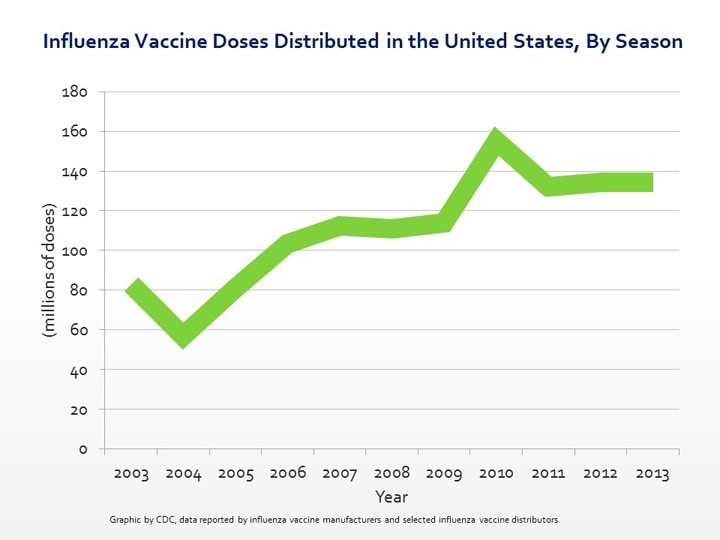|
View the Latest Influenza Information From This Week.
|
| Having trouble viewing this email? View it as a Web page. |
|
Influenza (Flu)
 |
|
|
|
|
CDC Influenza News and Highlights
January 29, 2016
|
|
|
|
|
|
The most recent FluView report shows increasing flu activity in the United States. Further increases in activity are expected in the coming weeks. Flu activity most often peaks in February and can last into May. It is not too late to get your flu vaccine this season. Flu vaccines this season have been updated to better match circulating viruses and most circulating viruses so far are still like the recommended vaccine viruses for this season.
CDC recommends a yearly flu vaccine for everyone 6 months and older. Vaccination can reduce flu illnesses, doctors' visits, and missed work and school due to flu, as well as prevent flu-related hospitalizations. More than 145.8 million doses of flu vaccine have been distributed in the United States. It takes about two weeks after vaccination for protection to set in, making now the perfect time to get vaccinated. Find a Vaccine.
|
| |
|
|
|
2015-16 Total Doses Distributed
01/22/2016 ≈ 145.8 million doses
01/15/2016 ≈ 145.6 million doses
01/08/2016 ≈ 145.4 million doses
01/01/2016 ≈ 144.9 million doses
12/11/2015 ≈ 143.3 million doses
12/04/2015 ≈ 142.0 million doses
11/27/2015 ≈ 140.5 million doses
11/13/2015 ≈ 132.7 million doses
10/30/2015 ≈ 123.7 million doses
10/23/2015 ≈ 118.2 million doses
10/09/2015 ≈ 109.4 million doses
10/02/2015 ≈ 98.5 million doses
9/25/2015 ≈ 92.3 million doses
9/18/2015 ≈ 76.1 million doses
9/11/2015 ≈ 65.1 million doses
9/04/2015 ≈ 40.7 million doses
|
| |
|

View Larger Version
|
| |
|
|
| |
|
CDC has launched the #VaxWithMe selfie campaign as an innovative way to capture and share flu vaccination promotion across various digital platforms (Twitter, Facebook, Instagram, and YouTube). This campaign encourages individuals to share photos and videos of themselves (hashtagged #VaxWithMe) during or after getting a flu shot.
To see an interactive display of selfies posted for this campaign this season, visit: CDC Posts weekly updates to the campaign timeline!
|
| |
|
| |
|
 Some avian influenza viruses have caused rare, sporadic infections in people, resulting in human illness ranging from mild to severe. These viruses are of public health concern because of their ability to cause human illness and also because of their potential to cause a pandemic. Infected birds shed bird flu virus in their saliva, mucous and feces. Human infections with bird flu viruses are rare, but they can happen when enough virus gets into a person's eyes, nose or mouth, or is inhaled. Some avian influenza viruses have caused rare, sporadic infections in people, resulting in human illness ranging from mild to severe. These viruses are of public health concern because of their ability to cause human illness and also because of their potential to cause a pandemic. Infected birds shed bird flu virus in their saliva, mucous and feces. Human infections with bird flu viruses are rare, but they can happen when enough virus gets into a person's eyes, nose or mouth, or is inhaled.
|
| |
|
| Content source: National Center for Immunization and Respiratory Diseases |
This email was sent to list-cdc@xxxxxxxxxxx using GovDelivery,on behalf of:
Centers for Disease Control and Prevention • 1600 Clifton Rd • Atlanta, GA 30333 • 1-800-CDC-INFO (800-232-4636) |
 |
|

